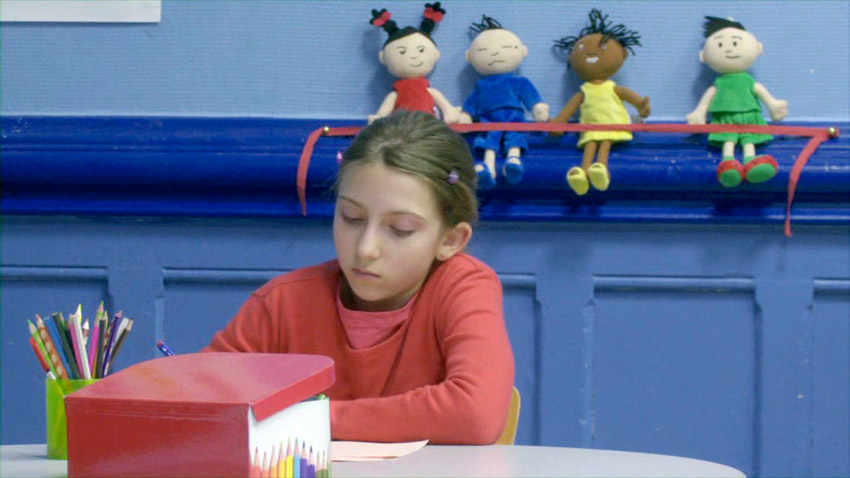
Treading the line between art installation and actual motion picture, “My Name Is Hmm” represents the directorial debut of fashion designer agnes b..
That is to say, it is “a film by Agnes Trouble aka agnes b.,” an intimate touch
but one that suggests a difficulty regarding point-of-view. The onomatopoeia in
the title should also tip you off that this is one of those pictures about
exploring: the fashion mogul feels as if she’s learning bit by bit how to tell
a story cinematically, how to complete transitions and flash back and forward,
how to set a mood and tempo. It’s basically the rough cut of a student film
which, to its credit, is also often more interesting than most student films
outright.

The story follows Celine (Lou-Lelia Demerliac), a tight-lipped young girl in
a family in chaos. Mom (Sylvie Testud) is working around the clock to support
them. Dad (Jacques Bonnaffe) is having bigger problems. He can’t, or won’t,
find work, and has difficulty keeping the monster at bay, getting drunk and
having his way with young Celine while his two younger children wait
downstairs. As upsetting as it seems on the outside, Celine has nonetheless
accepted this as routine, assuming that all fathers are like that. Her father
curses himself after these acts, suggesting he’s had a tremendous amount of
guilt. In the hands of another filmmaker, this would feel like a sign of
humanity. It doesn’t seem believable here, instead giving that character an out
in depicting Celine’s life as slightly fractured, not deeply upsetting.
That’s part of the film’s M.O., which takes a fairly flighty view towards
Celine’s childlike scolding of her father, as she warns that he keep away from
her little sister while he looks on direly. After this, there is a field trip
in which she vanishes, walking away from the group so gingerly she might as
well be floating. She finds herself in the cabin of a truck driven by Peter
(Douglas Gordon), a Scottish trucker making his way across the countryside.
Peter is clearly a man who has gotten used to his solitude, tattooed and
unkempt, but silently authoritative among his peers. He wears his unhappiness
on his face with ease, selective with his words. He’s just about the only
character that doesn’t reveal their emotions through a tortured, obvious
dialogue exchange.

Perhaps that’s why Celine likes him so much, as they become a traveling duo
exploring the countryside while her family grieves. She re-names herself Hmm, attaching herself to Peter like a life-raft. In turn, he takes pity on the girl, feeding and clothing her. The understated way this otherwise simple trucker responds to Celine’s assertions of abuse suggest a moral compass, though he never once thinks to find a safe haven for the girl. As they drive, the family comes apart at home, but Hmm is experiencing some sort of adventure, so all other concerns fall by the wayside. Her narration combined with the ethereal direction implies this is a dream for a little girl, as she experiences no fear or homesickness.
agnes b. proves herself to be a fan of living in the moment, so fans of formalism will see a nightmare in the film’s cautious moments of rack focus and excursions where it feels as if the camera is slowly sliding off a tripod. Her favorite technique is focusing on a moment between characters, then slowly pulling into a close-up of dead space on the screen as the camera jitters to and fro. Frequently, she replaces establishing shots with still photographs, and by the end of the film she’s just randomly interrupting scenes with them. In a couple of scenes, she switches to very low-grade digital video. It feels like it’s meant to preclude a revealing or emotionally resonant scene. It does not.
The most potentially fascinating character in this film is Peter, though he remains a blank slate. His assistance of this girl is a kidnapping, and he doesn’t seem to understand that the end of the road is approaching. His conversations suggest he’s deeply concerned with her, but not himself. It seems insincere that the film wants him to be extraordinarily attuned to her needs, but not his own, to be clearly intelligent and mindful, but to simply indulge this little girl in her runaway fantasies. The picture remains concerned with images like a performing kabuki duo in the forest, or a train station dance troupe, observing bodies in motion. As an art installation, this could be an interesting film to watch, cock-eyed, intrigued by the visual techniques of an obvious first-timer. But it is not a film. [D+]





